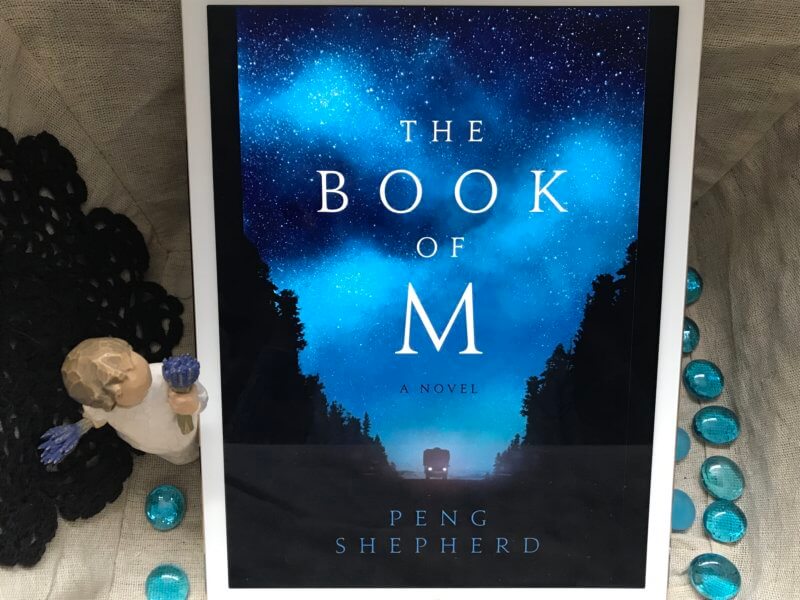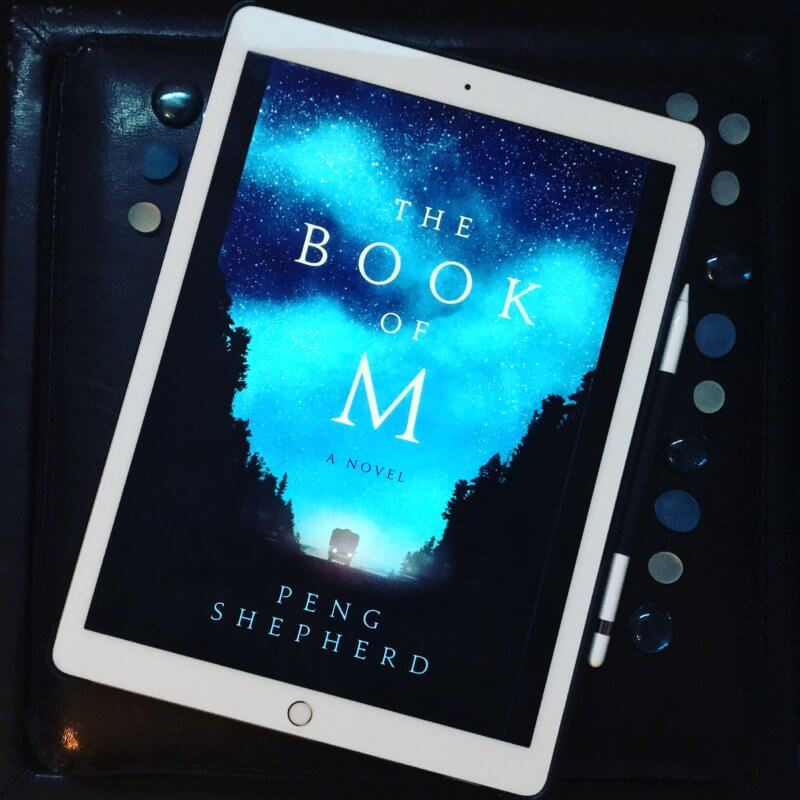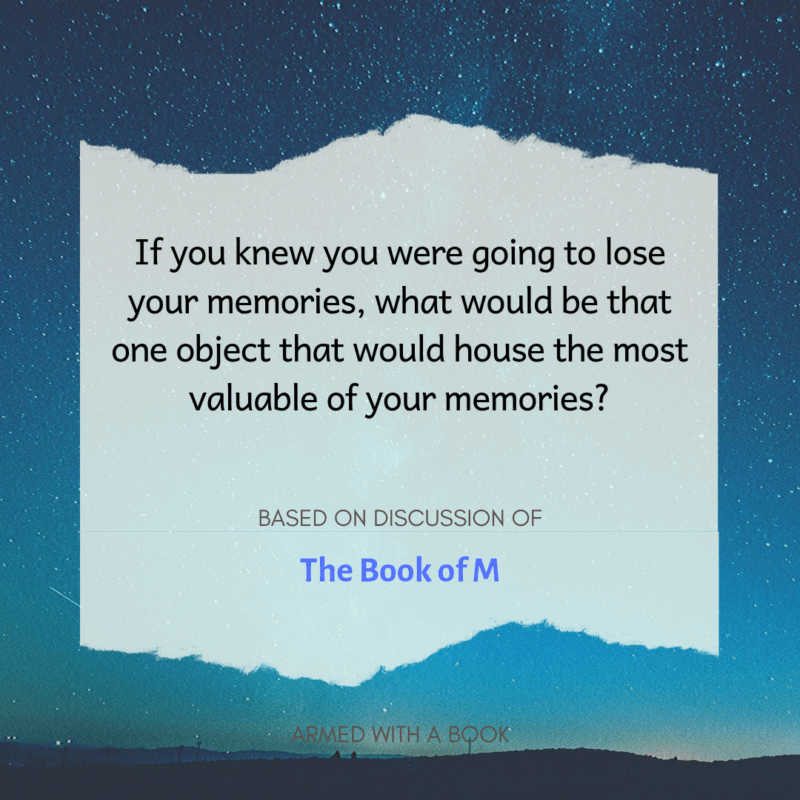Varun and I finished reading The Book of M last week and we are so happy you are here to check out The Book of M – Part 2. Previously, we had mentioned why we picked up this book and our first impressions about the characters and the setting. We had also speculated what the rest of the book could help us with – the mysteries it would resolve. Now, it’s time to share what we discovered.
Synopsis (Parts III, IV and V):
As a dystopian novel, The Book of M is a unique take because it explores the phenomenon of vanishing shadows. This is linked to magic as well as memories. Ory and Max had come up with a plan for them to not forget, and that was through recording on a tape recorder. I had not come across this connection before. What about you, Varun?
Dystopian novels give me the jittery feeling each time I pick one up. There’s much that we don’t know about humanity yet and each novel of the genre tries to delve a little deeper into the unknown. The Book of M has certainly caught me off-guard that way. As I mentioned in the previous article, the story tries to construct itself in a manner which is more believable than many themes that other books follow. Parts III, IV and V expand the story to characters who I thought won’t play a pivotal role later. Like Ursula and her carriage party who we met in Part I and Paul and Immanuel, who are a subconscious driving force for Ory to lead the shadowed ones to safety. What do you think makes these three parts special?
I think the bigger question in all three parts was how Max was going to keep her memories. Would she just listen to the tape recordings when she started to forget? But what about when she could no longer remember how to operate the recorder itself? The book did a good job of answering these questions hypothetically for me. I agree that Ursula’s party, Paul and Immanuel played major roles in these parts, which I had not anticipated, showing that the fight for survival goes on in so many ways and places, more than anyone can comprehend. Without these side perspectives, Peng would not have been able to express the extent of turmoil caused by the shadows.
The problem that I face with most dystopian and magic related books are the science in there. The act of extracting the memory from an object may be partly magic but the logical mind wants to know the how. As much as The One who Gathers lived up to his name, I felt that one revelation made him such a big thing. I would have liked to slow down that process a little bit. I almost feel an additional part would have been nice to understand the sheer transformation that he went through mentally. What did you think about his character development in these parts?
The One Who Gathers. I’d like to confess that I had a hard time comprehending his character at the moment of revelation. It seemed like a magical rags-to-riches story. Someone who hardly had any knowledge – scientific or otherwise – about the shadowless, suddenly knew enough that he could help them heal and give them new shadows. Peng did well in explaining and connecting several events in the story, but even I long for a more elaborate description of what really happened to him.
Cultural Influence:
It was only recently that we were discussing how diverse and rich the Indian culture is as far as mythology and religion are concerned. When Hemu Joshi first mentioned the stories of Gajarajan, Surya and Chhaya, I have to say that I had no clue what he was talking about. I commend Peng here for being so thoughtful about our culture. To have an entire story so immaculately crafted and intertwining a few key characters with it was the most enjoyable thing for me from these three parts of the book. It was also a change of air from the stereotyping of certain Indian traditions that I sometimes witness in books that make some thoughtful attempts at inclusiveness, but fail.
Do you think that these folktales and their characters stand out in their own way, amidst the hoi polloi in search of crude, reasonable answers for their loss?
I always find stories about Indian gods fascinating. There are so many of them though – gods and stories! But in our culture, there are a couple of main gods that we learn about – Vishnu, Krishna, Ganesh. With Mahabharat and Ramayan being the texts taught in schools and popular as TV series, the stories of smaller gods like Surya and Chhaya are less known. One of the things I absolutely love about Indian gods, and Peng reminded me, as you did in your comment here, that they are human. They have problems, they don’t like things, and they find solutions, or doppelgangers in this case. 🙂 This also reminds me of Norse gods. They have similar strong characters.
That aside, what did you think of the church group that Ursula and her van party met on their journey? The people in white had a very different angle on the shadowlessness.
One the one hand, I think that the Transcendence was nothing more than a fanatic group of people who wanted to gain more power, even if it cost them their memories. But I also feel that they wanted to control the shadowless in some way. The way they had bound Lucius when the reached the gates of The One Who Gathers in New Orleans made me wonder if they were also planning to gain control over the shadowless and use them for their benefit. I’m not certain what they might gain through that, but in a lawless world, a faction that rises with a majority and force by its side is the one that rules.

The Present and the Future:
I find Peng playing with some contemporary concepts here. One of them being that faith isn’t always an empty vessel if it has been based on Gods and mythology. Kind of questioning the reality. But faith can also be misused to bring down courage and bravery; the fight for a greater and a better cause. It can result in treatment of those who are not quite aware of their abilities as objects. In a way, the shadowless captured by the Transcendence may have been no better than any inanimate object, like a twig from a tree or a book. Coincidentally, The One Who Gathers tries to pick shadows from these very articles when he tries to reconstruct shadows for people. He thinks of injecting life into people through objects; the Transcendence is acting on an exactly contrasting idea to his.
I have an interesting question about the living beings from the book. Do you think if some of the shadowless had pets with them when they took refuge with The One Who Gathers, their shadows might help with reconstruction of shadows for their human owners?
That is an interesting question, indeed! I honestly do not know. I am still a bit unclear about how The One who Gathers was extracting memories from inanimate objects, but that still destroyed the objects at the end. Would pets with shadows have the same patience as the objects? How would the process work for them? Humans are still more predictable than pets, so why not use the family of the shadowless to bring memories back?
Some Noteworthy Characters from Parts II,IV,V:
Naz
Reading the story makes me a little sad for Naz’s character. She’s been really brave at most stages of her development as an able soldier and fighter and yet I feel that the one thing she deserved the most at the end is the one she’s been deprived of. While Ory’s expectations remained unfulfilled, Naz was caught between two worlds. One where she had enough love for Ory and the other which fell apart but still showed her enough for her to not go back to Ory the way she wanted to. Losing her family and her sister was huge blow. Two years of toil didn’t really bring her the gratification she needed like many others in the story.
Honestly, I think this will always be one of those books where no one is satisfied. As bad as I feel about Naz, every single one of them in the story are on a journey that we are no longer a part of. The One who Gathers has his own troubles, Ory has his own, so do all the other characters we met. They have to learn to live in this world, with or without their shadows. And we will not know how that turns out to be, unless, of course, Peng decides to show us.
But isn’t that how dystopian novels usually end? 🙂

M
In a way, this was her journey and not her story at the same time. We felt uncertainty and anguish through her recordings. For a moment I felt that she might be the first shadowless who never forgets. Her transition happened in a split second at different stages in the story and yet it never felt like this was not supposed to happen. I’m happy for M, though. To materialize in this world once again, with the same memory gives me vibes of a rebirth.
Peng depicts a human fallacy through her character: Love can manifest itself for a person without memories, but doesn’t have a place among memories when the person is lost. Memories, quite truly, fade away with time.
Vienna
She’s an unsung hero of the story. Her character arc was a small one without much to learn until she lost her shadow. She found peace and harmony when the world was at the cusp of transition to having a shadow again. She’s the postmodern child who will live to tell stories of shadowlessness and the feeling of having memories. I think she might be the one who can truly understand the pull. I didn’t see a hint of that knowledge in M, but perhaps she will know that better than any other character we know.
I think Max was trying very hard to keep her memories while Vienna made peace with that aspect of shadowlessness and took it in her stride. That might have something to do with the people that surrounded her – Naz, Ory and Malik are all fighters whose ultimate goal was to survive, rather than remember. Max did not want to forget for her love of Ory and the consequence that might have on him. Vienna did not share the same thoughts about her family and that is why she was able to control her actions.
Conclusion:
This concludes our buddy reading of Book of M. The more I discuss books on Armed with A Book and other book lovers, the more I gain from the stories. I find that it is not really about the book itself, it’s about the characters and the lessons we learn from them. Varun and I have been talking about books for as long as I can remember and it is quite neat that our first buddy read led to such a profound discussion, touching on our culture among other things.
If you have already read The Book of M, do share your thoughts and what you thought of our discussion in the comments area below. Also, answer this one question for us:

For Max, it was her tape recorder. For me, it’ll be my bullet journals. For Varun… well, Varun, what do you say?
Kriti, after reading this book, I think it’s time I began storing my memories somewhere too.
Thanks for reading our discussion. 🙂 Have some ideas for buddy reading? Send me a message here.
Social Links:
Kriti: Twitter Facebook Instagram
Varun: Twitter Instagram
Cover Photo by m wrona on Unsplash

This book was such a surprise and I really loved it! My heart was broken at the end. I’ve never had such strong emotions as I did with The Book of M!